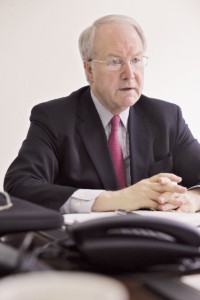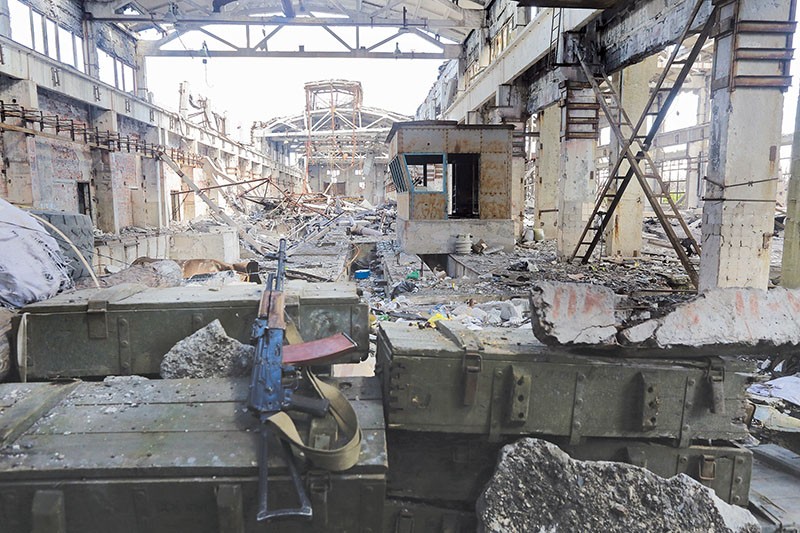Name: Bate C. Toms
Position: Owner of B. C. Toms & Co. law firm
Key Point: Three-point plan to spur investment: 1. political risk insurance; 2. legal ombudsman; 3. fix legal mistakes in land leases and other areas.
Did you know? Toms is the president of the British Ukrainian Chamber of Commerce and one of the first American lawyers to practice in Ukraine following the collapse of the Soviet Union in 1991
It wouldn’t be Bate C. Toms if he didn’t have a plan for Ukraine’s rescue that he promotes every chance he gets.
Toms, one of the most prominent lawyers in Kyiv for more than a quarter-century, says that if his plans are adopted, foreign investment will pour into Ukraine as never before.
With the nation needing tens of billions of dollars to build the economy in many sectors, it has received an average of $2 billion or less annually since independence in 1991.
There are two principal reasons why Ukraine is not receiving large amounts of investment, said Toms, who is also the long-time president of the British Ukrainian Chamber of Commerce.
Those are: Russia’s war in eastern Ukraine and lack of rule of law.
His solutions: A political risk insurance fund and creation of an independent legal ombudsman to ensure rule of law.
“The combination of a rule of law system and political risk insurance should open the floodgates to investment in this country as everyone knows Ukraine has enormous potential,” Toms told the Kyiv Post in an interview this month. “Presently assets are for sale at very attractive prices. The U. S., China and most of the rest of the world was built on foreign investment. Ukraine should be as well.”

Bate C. Toms
– Position: Owner of B. C. Toms & Co. law firm
– Key Point: Three-point plan to spur investment: 1. political risk insurance; 2. legal ombudsman; 3. fix legal mistakes in land leases and other areas.
– Did you know? Toms is the president of the British Ukrainian Chamber of Commerce and one of the first American lawyers to practice in Ukraine following the collapse of the Soviet Union in 1991 (Pavlo Podufalov)
Russia’s war
“As long as people are being shot on the front in eastern Ukraine, it scares foreign investors,” Toms said. “We have no trouble in general finding foreign companies. We have no trouble finding individuals within major world class investors who see enormous opportunities in Ukraine. The problem comes when they present these opportunities at the board level. The board says ‘wait a minute. There’s a war going on. If the war expands and we take a total loss we will look pretty foolish.'”
Rule of law
Toms said that “the second principal reason why investors won’t invest in Ukraine are the problems associated with the rule of law and corporate raiding. Ukraine has a huge reputation in the West as being a lawless country, where local powerful people steal property from foreign investors as well as locals. And while there has been huge progress made by the current government in reforming the judicial system, this has had relatively little impact so far on the foreign investment community, since positive reputations take time to build.”
As daunting as those problems are, the solutions are pretty simple, Toms said.
Risk insurance
First, he said, Western governments should be financing political risk insurance to protect investment in Ukraine. The fund could start at $2 billion, he said, with the United States, the United Kingdom, Japan and the European Union nations making the initial contributions.
He said that the World Bank’s Multilateral Investment Guarantee Agency could administer the fund.
Most likely, Toms said, the fund would not have to pay anything out — especially if Russia’s war ended.
He believes that Western governments owe it to Ukraine to help spur private investment, particularly the United States and the United Kingdom, as signatories to the 1994 Budapest Memorandum.
The Budapest agreement, also signed by Russia, gave Ukraine assurances of territorial integrity and national sovereignty for giving up its Soviet-era nuclear weapons. Russia violated the agreement with its 2014 annexation of Crimea and instigation of war in eastern Ukraine.
“The political will should be there,” Toms said. “Actually, the cost to these countries should be nothing assuming that the conflict is ended and it should be, certainly based on what President Donald J. Trump has proclaimed: That there would be no further aggression. If there is no further aggression, risk insurance provides guarantees to invest at essentially no cost.”
How it works
The insurance underwritten by the World Bank’s MIGA program or the U. S. Overseas Private Investment Cooperation “is typically done at very, very low costs.” Other areas in conflict zones, such as Israel’s West Bank and Gaza Strip, offer risk insurance to businesses, he said.
“The insurance covers all the money you put in and sometimes can cover some of your profits, depending on the nature of the policy,” Toms said. “The main thing that it does is to reassure the investor that he is not going to suffer a total loss.”
The risks of Russia’s war and lack of rule of law are the reasons that so many investment projects have been put on hold.
Corporations “have simply suspended activity until the conflict is well and truly resolved and, even several years after the conflict has stopped, political risk insurance is available and they can insure that risk. If such a policy can be offered to the West Bank and Gaza, it is hard to understand why it could not be offered to Ukraine. Ukrainians need to push for this.”

A gun lies propped on a firing positions in the Avdiyivka industrial zone on May 17 in Ukraine’s disputed eastern Donbas. While Russia’s war rages on, there are ways to mitigate risks and attract more investment, argues Kyiv-based lawyer Bate C. Toms. (Volodymyr Petrov)
Legal ombudsman
When it comes to the other main roadblock to investment — the lack of rule of law — Toms also has a magic bullet of sorts.
“We think there’s a way to fast track the economic recovery and the investment recovery based on rule of law,” Toms said. “That is the development of outside supervision of the judicial system. There’s been a tendency since Soviet times for it to function as one system evaluating cases rather than layers of court. The rumors are that corruption spreads up and down, so appellate review is not what it should be.”
What’s needed is an independent legal ombudsman, with an adequate budget, staff and powers, to referee legal disputes.
“There are many different ways that a legal ombudsman could function,” he said. It could be given statutory powers to make legally binding rulings or simply to have advisory judgments followed because of the “authority based on its reputation.”
The idea was pioneered in Sweden in the early 1900s and helped transform the Nordic nation of 10 million people from one of the most corrupt to one of the least corrupt nations in Europe, he said.
The legal ombudsman’s rulings could avoid lengthy and costly arbitration abroad, as well as help the government pinpoint bad judges and administrative agencies, he said, “especially in the area of re-registration of titles to land and real estate, where there are so many reported abuses presently.”
Such disputes are “expensive for investors” and “seriously damage the reputation for Ukraine. We can greatly reduce the enormous cost to Ukraine’s reputation and overnight create a story that can be spread in the press around the world as to how Ukraine solved the problem of corruption in its courts, once and for all.”
Land-lease overhaul
The third area for critical change, Bates said, is correction of the defects in a law that made “99 percent of land leases registered between 2008 and 2016 technically invalid. This is a ridiculous situation since millions and billions of dollars in investment have been based on these land leases.”
The legal problems were introduced by corporate raiders, he said, and fixed in 2016. But, he said “it becomes very difficult to keep the investor at the table” to consider land leases during the problematic eight-year period.
“Over the next seven years, the problem will take care of itself,” he said. “But Ukraine’s economy needs to move quickly. There’s no excuse not to redress the historical problem with existing land leases to make them all effectively valid.”
